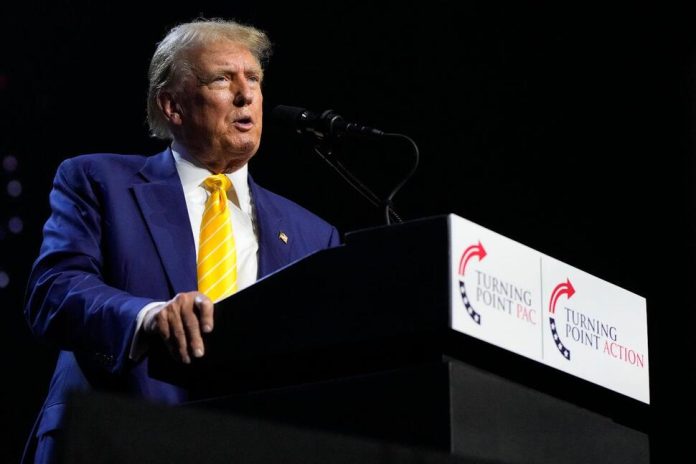Donald Trump on Monday urged a strongly anti-abortion Christian group to stand up for “innocent life”, in an ambiguous return to an issue Democrats want to make a major issue in this year’s presidential election, US media reported.
In a pre-recorded address, the former president and presumptive Republican nominee praised the work of those who attended the Danbury Institute event, which is being held in Indianapolis in conjunction with the Southern Baptist Convention’s annual meeting. The newly formed institute is an association of churches, Christians and organisations that seek to completely eradicate abortion.
On Monday, a group of in-person speakers doubled down on their stance against abortion, with a Southern Baptist leader calling for a strong stance against in vitro fertilisation. Albert Mohler, president of a leading Southern Baptist seminary, said IVF is the “commercialisation of the embryo” which infringes on human dignity. He criticised pastors as well as politicians who have been open to it, including Alabama, which has defended IVF providers from prosecution and civil suits after the state Supreme Court ruled that frozen embryos are babies. Mohler said:
We’re about to find out how pro-life the pro-life movement is.
Trump has repeatedly credited himself with overturning the federally guaranteed right to abortion – he nominated three justices who struck down Roe v. Wade – but he does not support a national ban on abortion and says he wants to leave the issue to the states. Contrary to Mohler’s views, Trump supports access to IVF.
In his speech, Trump thanked the audience for their “tremendous devotion to God and country” and said everyone must unite to preserve their values, including religious freedom, free speech, innocent life, and America’s heritage and traditions. He said:
You just can’t vote Democrat. They’re against religion. They’re against your religion in particular. You cannot vote for Democrats and you have to get out and vote.
The split on abortion
Both Southern Baptists and Republicans are generally split on abortion policy, with some calling for an immediate and complete ban on abortion and others more open to gradualist tactics. Polls over the past few years have shown that a majority of Americans support some access to abortion, and pro-abortion rights groups have won several state-level votes since the repeal of Roe, including in conservative states like Kansas and Ohio.
Like the GOP, the Southern Baptist Convention has moved steadily to the right since the 1980s, and its members have been at the forefront of a broader religious movement that has strongly supported Republican presidents from Ronald Reagan to Trump. The Conservative Baptist Network, one of the event’s sponsors, wants to move the conservative denomination even further to the right.
Although they criticised President Bill Clinton’s sexual misconduct in the 1990s, Southern Baptists and other evangelicals supported Trump. This has continued despite allegations of sexual misconduct, multiple divorces, and now his conviction on 34 counts in a scheme to illegally influence the 2016 election through paying money to a porn actress who said they had sex. Trump spoke out on the same day he actually appeared for a mandatory interview with New York City probation officers before his sentencing.
Support from Southern Baptists
Many Southern Baptists say they see him as the only alternative to the Democratic agenda they hate.
H. Sharayah Colter, a spokeswoman for the Danbury Institute, said in a statement that the presidential race is a “binary choice” and noted that Trump has “demonstrated a willingness to defend the value of life even when he is politically unpopular.”
And Mohler, who heads the Southern Baptist Theological Seminary in Louisville, Kentucky, and was once an outspoken critic of Clinton, wrote a column after Trump’s election attacking Democrats for supporting transgender rights. He wrote:
Say what you will about Donald Trump and his sex scandals, he doesn’t confuse male and female.
On Monday, he condemned Trump’s prosecution and sentencing, while other speakers touched on Christian nationalism and the merging of American and Christian identities.
Trump has said he would not sign a national abortion ban, and in an interview on Fox News Channel last week, commenting on how some states enshrine abortion rights and others restrict them, said “the people decide, and in many ways it’s a beautiful thing to watch.”
For more than a year, until he announced his position this spring, Trump had refused to support any specific national restriction on abortion, unlike many other Republicans who ended up ending their presidential campaigns. Trump has repeatedly said the issue can be politically difficult and has suggested he would “discuss” policies that would include exceptions for rape, incest and protecting the life of the mother.
